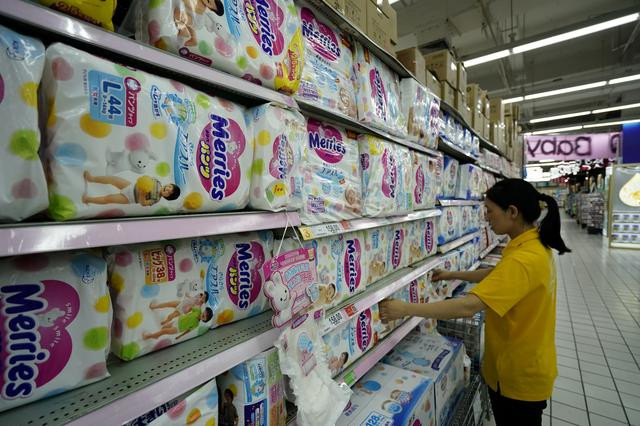Confident in the quality of their diapers and knowledge that the Chinese market favors Japanese-made baby products, despite declines in sales, Kao Corporation's "strategy is to go for the premium market" and not " volume."
With China's easing of the One Child Policy in 2016, the baby care industry saw a bright future.
However, because of national scandals involving China's baby care industry, many Chinese parents prefer higher-priced versions of baby products from other countries, specifical diapers from Japan, though there's little difference in quality.
A homegrown tainted milk formula in 2008 gave birth to the perception of many Chinese parents that Japanese brands are superior.
This belief has served Kao well that its Chinese diaper sales made it the second-biggest supplier of diapers though it just started operations in 2009.
Because of China's clampdown this January on Chinese shoppers buying imported products, Kao got hit.
The tightening on Chinese shoppers extended to the "daigou" merchants, who buy goods abroad and resale them online in China. New rules in China that got rolled out state that e-commerce service operators should only work with registered sales agents.
This resulted in a drastic drop of unregistered suppliers and Kao, more dependent on its online sales, saw their baby diaper profits going down 14% in the first half compared to last year during the same period.
Confident in the quality of their diapers and the knowledge that the Chinese market favors Japanese-made baby products, despite declines in sales, Kao Corp's "strategy is to go for the premium market.
We don't want to go for volume," said Tomoharu Matsuda, Kao managing executive officer in charge of consumer products.
This, the company did by offering premium diapers that are softer and cost 4.9 yuan per diaper or $29 for a medium-sized pack of 40, double its standard price and too expensive for the Japanese market.
However, Kao's "Tender Love" Merries, though made in Japan but only for sale in China, was unable to offset the loss in sales.
Even so, Kao put money in advertising not only to strengthen its market position but to take advantage of the expected spike in demand because of the sales tax rise.
Still, the company is seeing its profit estimate the same for the year because of the projected increase in sales brought about by Japan's national sales tax in October to10% from 8%.
Overall, estimates for a year of sales are to be the same at 1.58 trillion yen, up 5%.





